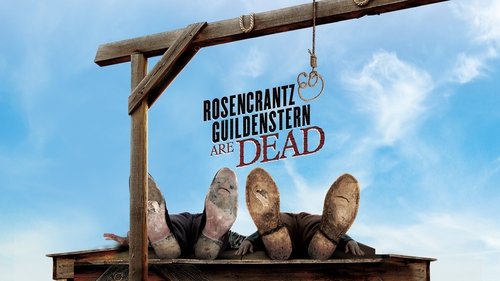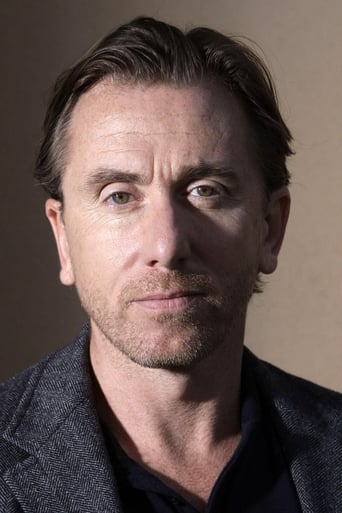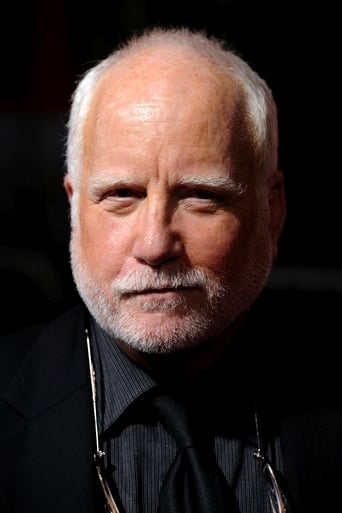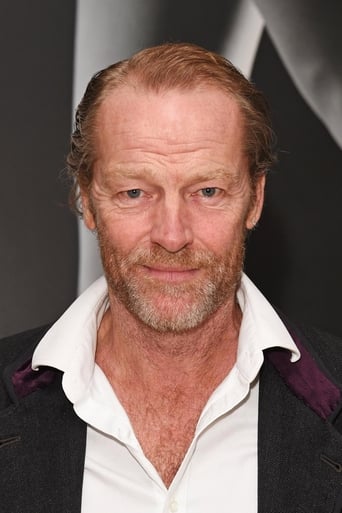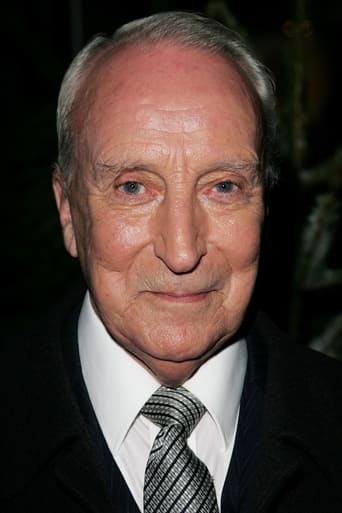Curapedi
I cannot think of one single thing that I would change about this film. The acting is incomparable, the directing deft, and the writing poignantly brilliant.
ChicDragon
It's a mild crowd pleaser for people who are exhausted by blockbusters.
Roxie
The thing I enjoyed most about the film is the fact that it doesn't shy away from being a super-sized-cliche;
Cassandra
Story: It's very simple but honestly that is fine.
oniraptor
This, along with Almost Famous, is the best movie I've ever seen. The writing, directing, acting, costumes, sets, cinematography; Perfection. It makes me laugh, it makes me sad, it makes me think. There is a gem to be found in every scene. Roth, Oldman, and Dreyfus are consummate in what they bring to the film. The idea of the back to front view of Hamlet is where it's real brilliance lives and knowing Hamlet gives you everything to understand the subtleties in the film. The prefect compliment of one to the other. Okay, there is one flaw to me. The top of the third act has a needless bit of slapstick which does pull you out of the moment. That being said it does also show you how good the rest truly is by comparison. That's also why it is only 9/10.
Ethan Kaiser
Rosencrantz and Guildenstern are dead blends the laws of nature with the principles of existentialism; Through this 'comedic' duo of Rosencrantz and Guildenstern, Tom Stoppard gives the audience a clear understanding of the existentialistic lifestyle: no matter what choices they make, they are trapped under the predestined death that awaits them both on the stage and in the film.The similarities between the stage and the cinema can be compared with the similar devices that are used: The camera, much like a stage, is an instrument that is used to see exactly what is placed before it. The objective now becomes not necessarily what to show the audience, but what not to show them. The audience is in full awareness that you have the power to show them anything you want at any given time, and in this case, what not to show them is Hamlet.The film is started with Pink Floyd's soundtrack 'Echos'.And no one showed us to the land And no one knows the where's or why's But something stirs and something tries And starts to climb towards the light -'Echos' by Pink FloydThis musical choice of Stoppard's soundtrack for the film could not be better. 'Echos' begins with faint sounds of radar, which exemplifies Rosencrantz and Guildenstern's search for themselves; however, they are yet do discover that through their inevitable fate, their constant search for identities will never matter. The lyrics (although instrumented for the film) furthermore develops Stoppard's relationship to The Theatre of the Absurd of not knowing how, why, or what they were doing there. This instrumental version of the track shows how Stoppard (knowing that the lyrics are absent) still took on the great integrity to the song's meaning. As far as the echoes go in the film (pun intended), Rosencrantz and Guildenstern shout several different words throughout the movie, and in turn, are faintly heard by the other characters. This phenomenon might just be Rosencrantz and Guildenstern near the edge of breaking through the script, but as much as they try, they are unable to: they simply reverberate and fade back into their state of nothingness: they cannot escape. Guildenstern seems to have an interesting approach to this dilemma, saying that simply choosing 'what you want' overrides the agony of this universal determinism. "There's a logic at work–it's all done for you, don't worry. Enjoy it. Relax. To be taken in hand and led, like being a child again" (Pg 40). This philosophy was distinguished by Davd Hume, commonly referred to as Compatibilism. Compatabilism says that if your not 'enjoying' life, then what's the purpose of living? Stoppard seems to take a stab at Hume's philosophy with this play, showing that regardless of their fulfillment or enjoyment. Throughout the plot, their inevitable death's give them misery and anguish to constantly worry about. The Theatre of the Absurd is not just about existential philosophy, it establishes and questions all the different philosophies as well. Rosencrantz and Guildenstern are Dead addresses types of comedy like low, high, farce and even the more philosophical Comedy of Ideas. Between scenes of the film, pages are seen flying across screen, both before and after the scene change. These pages are commonly believed to be script pages; however, when taking a closer look, one would notice that the text originates from the Roman Missal, quite contrary to the anti-religious consistency the play develops. Here, Stoppard is adding yet another element to the play's determinism. Now, it becomes not what is controlling their fate, but who. When adding this religious context, the characters may indeed be controlled by God, and in result may be predestined to death by God himself: He leads us where we are destined to belong. Ros and Guil constantly question their existence throughout the time-frame of the play. With the many layers of philosophical inquiries and comedic ideas, one could agree that the final piece to this existential crisis lies in its many layers of reality. When the tragedians perform the play to King Claudius, Stoppard adds yet another level of existence to this play in the film. The first level, being the story of Hamlet, to the second plot of Rosencrantz and Guildenstern,then on to the Tragedians performance to Claudius, and the final, being the puppet show inside this performance of the Tragedians. This play-within a play-within a play-within a play-within a play exemplifies the many levels of existence and questions the reality of each: which is the real reality? Stoppard uses this clever approach to existentialism to show the true agony and misery Rosencrantz and Guildenstern face throughout their redundant lives, repeating each time the play commences. Both the film and play portray the existential lifestyle Ros and Guil are destined to face. No matter what they do, what they try, or what they don't do for that matter, all result in the same outcome. Even if they decide to enjoy their multi-layered cheeseburger and sail away on boats, Rosencrantz and Guildenstern truly cannot be free, regardless if they are trapped behind the stage, or'boxed' in the screen. Throughout the story, Stoppard ingeniously brought these characters to life–only to let them discover that they ultimately must die.
BrockPace
At my last movie night I watched the comedy Rosencrantz & Guildenstern Are Dead. I have seen and loved other films by director/writer Tom Stoppard, such as Shakespeare in Love and, one of my favorite films ever, Brazil. I have always appreciated these films for the incredibly detailed writing and plot structure that sets them up, so I was pleased to find a film that he created entirely himself. This film was one of the most deftly constructed comedies I have ever seen. I struggled to keep up with the jokes as they jumped from Hamlet references to literature battles of wit to references to scientific properties. The writing was the best part of the film, as it felt like an extended series of in-jokes for the viewer, who would only understand the movie if they had read the play, Hamlet. For example, one of the main jokes in the film is that the characters are constantly getting their names mixed up. You would only understand why that is if you had read Hamlet, as in the play these characters are interchangeable, appearing only in a pair. There was nothing particularly clever about the camera angles or movements, yet the cinematography succeeded by including subtle references, such as the pages that can be found in each scene, containing text from the bible, or the Shakespeare portraits that are located all around the castle. Unfortunately, towards the end the film began to feel tired as the main plots and jokes were constantly repeated while the newer jokes all just seemed to be silly slapstick humor. Overall, I thought it was an interesting picture and a more important supplement to Shakespeare's Hamlet. Grade: C+
Michael Neumann
It was a brilliant idea: to give two minor characters from Shakespeare's 'Hamlet' a life independent of the play, but Tom Stoppard's debut as a film director presents a near-textbook example of how not to adapt a work of theatre for the screen. Whatever virtues the film may have are entirely those of Stoppard's original stage comedy, up to and including the topsy-turvy wordplay, at times reminiscent of the old Abbott and Costello 'who's on first' routine. A passing familiarity with Shakespeare may be required to fully appreciate the joke, but in the end it's a moot point: camera tricks aside, Stoppard does nothing to translate his material to the visual grammar of film, so what might have sounded clever on stage comes across as stilted and pretentious on screen. Worse yet, his Hamlet isn't staged as a play, which seems to defeat the premise, and the film is further crippled by some unfortunate miscasting: Richard Dreyfuss is all wrong for the supposedly ominous Master of Players, and Iain Glen's Prince of Denmark compares unfavorably (believe it or not) to Mel Gibson's recent attempt at the same role.
